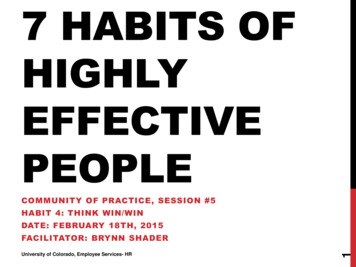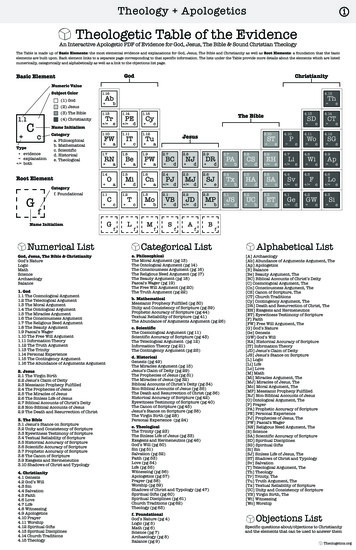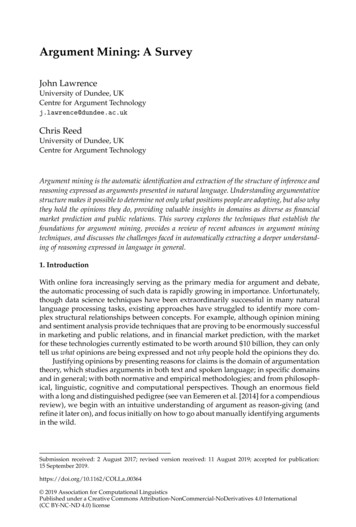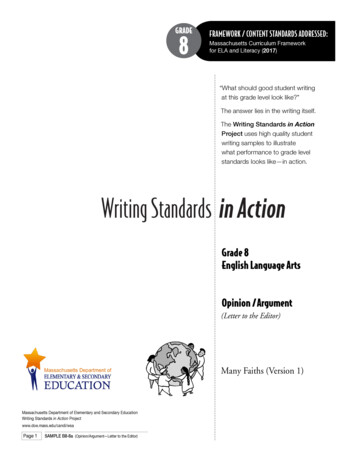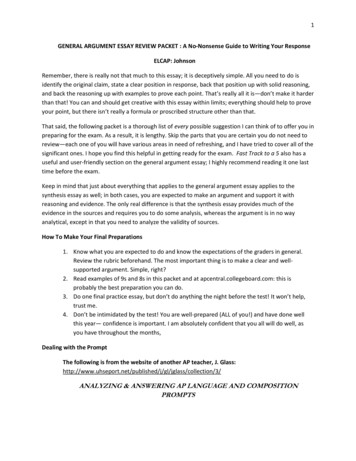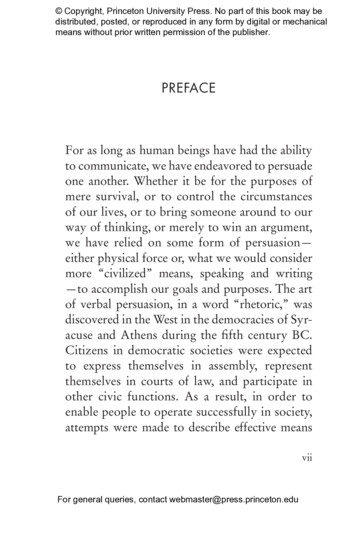
Transcription
Copyright, Princeton University Press. No part of this book may bedistributed, posted, or reproduced in any form by digital or mechanicalmeans without prior written permission of the publisher.PREFACEFor as long as human beings have had the abilityto communicate, we have endeavored to persuadeone another. Whether it be for the purposes ofmere survival, or to control the circumstancesof our lives, or to bring someone around to ourway of thinking, or merely to win an argument,we have relied on some form of persuasion— either physical force or, what we would considermore “civilized” means, speaking and writing— to accomplish our goals and purposes. The artof verbal persuasion, in a word “rhetoric,” wasdiscovered in the West in the democracies of Syracuse and Athens during the fifth century BC.Citizens in democratic societies were expectedto express themselves in assembly, representthemselves in courts of law, and participate inother civic functions. As a result, in order toenable people to operate successfully in society,attempts were made to describe effective meansviiFor general queries, contact webmaster@press.princeton.edu
Copyright, Princeton University Press. No part of this book may bedistributed, posted, or reproduced in any form by digital or mechanicalmeans without prior written permission of the publisher.P refaceof verbal persuasion, and a theoretical systemevolved that enabled citizens to plan and executea successful speech in public— in other words, towin an argument.Several centuries later, Rome’s greatest orator and one of the greatest speakers of all time,Marcus Tullius Cicero, secured Rome’s highestpolitical office, the consulship, having reliedheavily on this art of verbal persuasion to makea name for himself in Roman society. Trainedfrom boyhood in the technicalities of rhetoric,Cicero excelled not only as an effective publicspeaker, who won the vast majority of arguments in which he was involved, but also as atheorist in the art of verbal persuasion, havingwritten during his lifetime several treatises thathave rhetoric as their subject. And although heis highly critical of the typical rhetorical handbooks of the day, he was, nonetheless, steepedin their doctrine and reliant upon their methods. In fact, this rhetorical education for civicduty, handed down by the Greeks and adoptedby the Romans, remained a primary element inthe training of all educated people throughoutthe Middle Ages, into the Renaissance, and evendown into modern times.viiiFor general queries, contact webmaster@press.princeton.edu
Copyright, Princeton University Press. No part of this book may bedistributed, posted, or reproduced in any form by digital or mechanicalmeans without prior written permission of the publisher.P refaceGiven the centrality of rhetoric, that is, theart of verbal persuasion, in our Western tradition, I present here a short anthology of passagesfrom Cicero’s writings, primarily his rhetoricaltreatises, that capture the essence of this ancientrhetorical system of persuasion, a system thathelped to make Cicero and countless other orators effective speakers, able to convince peopleand win arguments. Readers will, I hope, findthese selections interesting in their own right, aswell as useful when thinking about their own efforts to persuade. Indeed, whether arguing witha friend over a trivial issue or presenting a briefbefore the Supreme Court, the goal of a speakeris still to persuade, and knowing the most effective means of persuasion in any given circumstance will lead to the successful realization ofthat goal. A peculiar paradox of contemporaryAmerican society is that, at a time when we findmany schools, colleges, and universities talkingseriously about fostering oral competency andgood communication skills in their students,we actually see very few effective public speakers in action, in the courts, in our communities,or in the public arena of political life. While thisbook is certainly not intended to remedy thatixFor general queries, contact webmaster@press.princeton.edu
Copyright, Princeton University Press. No part of this book may bedistributed, posted, or reproduced in any form by digital or mechanicalmeans without prior written permission of the publisher.P refacesituation, my hope is that those who think aboutspeaking in public and want to win argumentswill find it appealing, and will delight in the realization that the techniques for effective oralpersuasion discovered and enunciated millenniaago still make sense and have great relevance forthose who would speak convincingly today.In order to simplify matters and allow forsmoother reading, I have avoided appending foot notes to names and terms that might present challenges to readers who are unfamiliar with the historical period or the technical subject matter. In lieuof such notes, a glossary of names and terms hasbeen included near the end of the volume to whichthe reader can refer when seeking more detailedinformation or clarification. In addition, a list ofsuggestions for further reading on the subject hasalso been appended, consisting of both primaryworks by Cicero in English translation as wellas secondary works that elucidate and commentupon ancient rhetoric and oratory, Cicero, andhis works. All translations, except those from Deoratore, are my own. De oratore passages were previously translated jointly by my colleague, JakobWisse, and me, and appeared originally in ourcomplete translation of the treatise, publishedxFor general queries, contact webmaster@press.princeton.edu
Copyright, Princeton University Press. No part of this book may bedistributed, posted, or reproduced in any form by digital or mechanicalmeans without prior written permission of the publisher.P refaceby Oxford University Press in 2001, Cicero: Onthe Ideal Orator. Occasionally, I have altered aword or two of that original translation in thepassages that appear here.I would like to thank Mr. Robert Tempio, executive editor and Humanities Group publisherfor Princeton University Press, for suggestingthis volume to me, and for his guidance and direction in seeing it through to publication; andSara Lerner, senior production editor. I owe adebt of gratitude also to my copyeditor, Jennifer Harris, and to the anonymous referees ofthe Press, whose corrections, observations, andsuggestions improved the manuscript greatly. Idedicate this little book to Augustus James May,in the hopes that, as he grows in age and wisdom,he will realize the ideal of the Elder Cato, becoming a vir bonus dicendi peritus (“a good man,skilled in speaking”).James M. MaySt. Olaf CollegexiFor general queries, contact webmaster@press.princeton.edu
art of verbal persuasion, in our Western tradi-tion, I present here a short anthology of passages from Cicero’s writings, primarily his rhetorical treatises, that capture the essence of this ancient rhetorical system of persuasion, a system that helped to make Cicero and countless o
